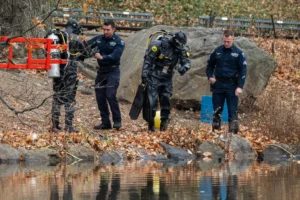By Cristin Dusk | Dec 05, 2024 Updated 08:11 a.m. ET
A man whom the police are seeking in connection to the brazen killing of Brian Thompson, the UnitedHealthcare chief executive, has passed by numerous surveillance cameras while in Manhattan. Could artificial intelligence-powered facial recognition put a name to the man whose identity has so far eluded the authorities?
The police have released two surveillance camera stills in which the entire face of a person the authorities are seeking is visible, including one in which he is smiling. Both images are grainy, and his face is captured from a sharply downward angle.
Anil Jain, an expert on facial recognition technology at the Michigan State University, said the photo in which the man is smiling contains enough detail for a facial recognition system to yield potential results.
“The challenge will be which face database to search against,” Dr. Jain said. Law enforcement officials could search the F.B.I.’s mug shot database, the drivers’ license databases of New York State and neighboring states, or public photos on the internet using a system such as Clearview AI.
A facial recognition search would yield a list of people deemed similar looking to the person in the original photo. The police would need to find other evidence to tie a person identified that way to the crime, Dr. Jain said, or run the risk of making a wrongful arrest.
Other experts disagreed about how useful the images could be for identifying the man.
Alessandro Acquisti, a technology and policy professor at Carnegie Mellon University, said that the photos shared with the public would not be enough to uniquely identify the man because they were not full-frontal images. They could, though, help to “restrict the pool of likely suspects,” he said.
Giorgi Gobronidze, the chief executive of PimEyes, a face search engine that anyone can use to find photos of a person on the internet, was skeptical that the poor-quality images would produce reliable results. A facial recognition system performs best with a high-resolution photo of someone looking directly into a camera.
Mr. Gobronidze also said that automated facial recognition would only work if the images of the person were in the database being searched.
“If the person in the image has little to no online presence,” Mr. Gobronidze said, PimEyes “won’t be able to find anything.”
A correction was made on Dec. 6, 2024:
An earlier version of this article misidentified the university where Anil Jain works. He is at Michigan State University, not the University of Michigan.








Be First to Comment